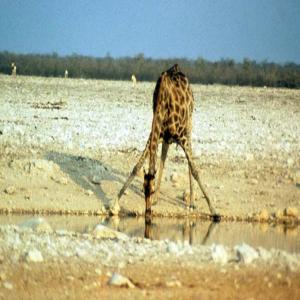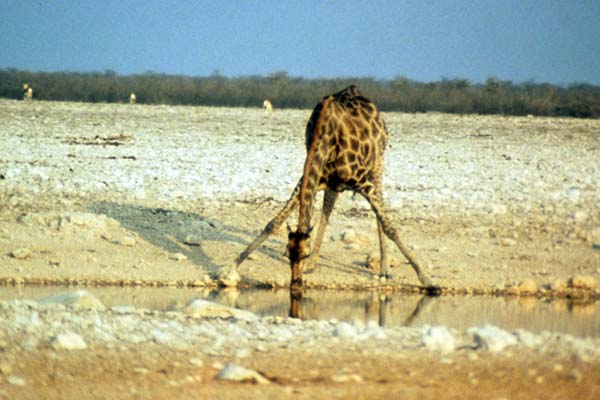Episodes

Wednesday Mar 09, 2016
Wednesday Mar 09, 2016
Go behind the scenes of a pangolin rescue with Thai Van Nguyen, founder and executive director of Save Vietnam's Wildlife, and Gillian Foster, the organization's Communications Advisor. Save Vietnam's Wildlife is the first Vietnamese NGO dedicated to saving pangolins. Pangolins are arguably the world's most trafficked mammal, with an estimated 100,000 captured each year. People hunt them for their meat and their scales, which are used in traditional Asian medicine. Vietnam has two of the eight pangolin species, Sunda and Chinese pangolins, both critically endangered. In just eight months (July 2015-February 2016), Save Vietnam's Wildlife rehabilitated and released 75 pangolins rescued from the trade.

Saturday Jan 31, 2015
The WildLife: From bats to humans - echolocation for the blind, Carol Foster
Saturday Jan 31, 2015
Saturday Jan 31, 2015
While researching bats for one of her films, documentary filmmaker Carol Foster learned that humans were also doing what bats could do, namely using echolocation to see.That set her off on a project to help the blind in Belize learn this amazing skill. She’s even launched a crowdfunding campaign on Indiegogo to fund the effort. In this interview, we talk about what we can learn from bats and how the blind uses flash sonar to see the world.

Monday Sep 15, 2014
The WildLife: Madison Vorva, Girl Scout and Teen Activist for Orangutans
Monday Sep 15, 2014
Monday Sep 15, 2014
In 2007 fellow Girl Scouts Madison Vorva and her friend Rhiannon Tomtishen embarked on a campaign to save the orangutan by targeting unsustainable palm oil production and the many products that use it, including Girl Scout cookies. Both young women have been featured on major media outlets and have won several awards for their activism, including the United Nations Forest Heroes award.

Monday Aug 25, 2014
Monday Aug 25, 2014
Since she was in 6th grade, Rhiannon Tomtishen has been passionate about orangutans. As a Girl Scout, that passion led her to fight for deforestation-free palm oil together with her friend Madison Vorva. The story of these two girls inspires young and old alike and shows how simple actions can make a big difference. Now 19 years old, this eloquent young women shares her experience and advises us all to follow our passion.

Tuesday Jan 28, 2014
Tuesday Jan 28, 2014
Kevin Bewick, head of the Anti-Poaching Intelligence Group of Southern Africa (APIGSA), provides his perspective on the fight against wildlife crime. His group undertakes investigations and focuses on intelligence gathering and research into wildlife poaching and trafficking.

Thursday Apr 18, 2013
The WildLife: CITES CoP16 Outcomes, CITES Secretary-General John Scanlon
Thursday Apr 18, 2013
Thursday Apr 18, 2013
John Scanlon, Secretary-General of the Convention on International Trade in Endangered Species (CITES), provides his perspective on the major outcomes of CITES 16th Conference of Parties, which was held in Bangkok, Thailand from March 3-14, 2013. The conversation covers overarching issues, such as enforcement, financing and political engagement, as well as species-specific items, including timber, sharks and elephants.

Friday Mar 22, 2013
The WildLife: Polar Bears, Global Warming and CITES Decision, Steven Amstrup
Friday Mar 22, 2013
Friday Mar 22, 2013
Dr. Steven Amstrup has been studying polar bears and their habitat since 1980, and much of what we know about them, and even how scientists study them, comes from his work. For instance, he was the first person to apply radio telemetry to the study of polar bears, which allowed scientists to understand the immense distances that polar bears travel, and that knowledge of their movements is vital to understanding polar bear ecology. He also developed studies to quantitatively describe denning habitat and developed the ability to locate dens under the snow with Forward Looking Infrared Imagery (FLIR). That allowed him to uncovered – quite literally – information about polar bear maternal denning. He made the unexpected discovery that over half of historic polar bear maternity dens in Alaska were on the drifting pack ice, and then, subsequently, he led work that showed that polar bears increasingly opted to den on land because of sea ice deterioration due to global warming. Over the three decades he’s been studying polar bears, Amstrup has observed a profound change in their Arctic habitats and the threats they face, and he often speaks out about the need to mitigate greenhouse gasses if polar bears are to survive as a species. Dr. Amstrup is currently senior scientist at Polar Bears International. He led the international team of researchers that prepared nine reports that became the basis for the decision, by the U.S. Secretary of the Interior in 2008, to list polar bears as a threatened species. He is a past chairman of the IUCN Polar Bear Specialist Group and has been an active member of the group throughout his career. Prior to joining Polar Bears International staff, he was the Polar Bear Project Leader with the United States Geological Survey at the Alaska Science Center, Anchorage, AK.

Sunday Feb 24, 2013
The WildLife: CITES Secretary-General John Scanlon
Sunday Feb 24, 2013
Sunday Feb 24, 2013
John Scanlon, Secretary-General of the Convention on International Trade in Endangered Species (CITES), reflects on the 40th anniversary of CITES, provides an overview of what to look for at the 16th Conference of Parties, and discusses species-specific issues, with an emphasis on elephants, rhinos and sharks.

Thursday Feb 21, 2013
The WildLife: A Lifetime with Elephants, Iain Douglas-Hamilton
Thursday Feb 21, 2013
Thursday Feb 21, 2013
Iain Douglas-Hamilton reflects on a lifetime studying elephants and discusses the current surge in ivory poaching. At age 23, Iain Douglas-Hamilton pioneered the first in-depth scientific study of elephant social behavior in Tanzania's Lake Manyara National Park. During the 1970s he investigated the status of elephants throughout Africa and was the first to alert the world to the ivory poaching holocaust. He and his wife have co-authored two award-winning books and have made numerous television films. In 1993, he founded Save the Elephants, a Kenyan conservation organization dedicated specifically to elephants. In 2010, he was named the recipient of the prestigious Indianapolis Prize, in recognition for his lifetime achievements.

Monday Feb 18, 2013
The WildLife: Celia's Campaign Against the Elephant Ivory Trade, Celia Ho
Monday Feb 18, 2013
Monday Feb 18, 2013
Fourteen-year-old Celia Ho from Hong Kong recently launched a campaign to stop the ivory trade after becoming inspired by Bryan Christy’s “Blood Ivory” article in National Geographic magazine. Her young voice represents a new hope for elephants that is increasing throughout Asia while her story illustrates how one person can make a difference.

